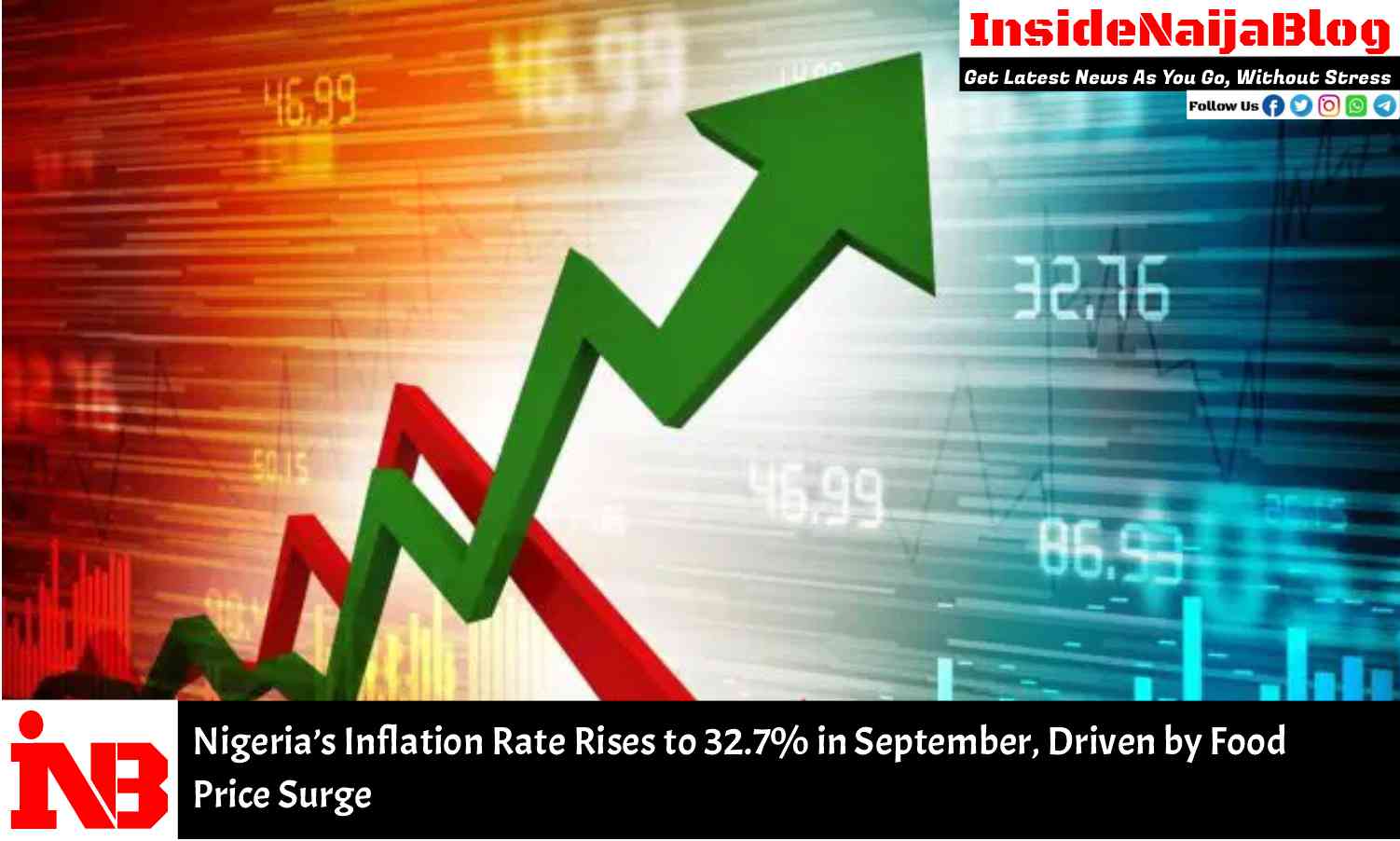Nigeria’s inflation rate surged to 32.7% in September 2024, reversing the downward trend of the previous two months, where the rate had slightly eased to 32.15% in August. The latest data, released by the National Bureau of Statistics (NBS) in its Consumer Price Index (CPI) report for September, highlights a significant increase in both headline and food inflation, raising concerns about the country’s economic trajectory and the rising cost of living for its citizens.
Reversal of Inflation Trend: What Happened?
The inflation increase in September marks a turnaround from the two-month period of marginal decline seen in July and August. According to the NBS, the headline inflation rate in September 2024 was 32.70%, up by 0.55 percentage points from August’s figure of 32.15%. This reversal is attributed primarily to a spike in food inflation, which significantly influenced the overall inflation trend.
On a year-on-year basis, the headline inflation rate for September 2024 was 5.98 percentage points higher compared to the same period in 2023, when the inflation rate was recorded at 26.72%. This year-over-year increase reflects the growing pressures on the Nigerian economy, where inflation has consistently been a challenge, exacerbated by external and domestic factors such as rising global commodity prices, foreign exchange volatility, and supply chain disruptions.
The NBS report stated, “In September 2024, the headline inflation rate was 32.70% relative to the August 2024 headline inflation rate of 32.15%. Looking at the movement, the September 2024 headline inflation rate showed an increase of 0.55% compared to the August 2024 headline inflation rate.”
Month-on-Month Analysis: Inflation Pressures Intensify
On a month-on-month basis, which measures the change in prices between August and September 2024, the headline inflation rate also climbed, hitting 2.52%. This represents a 0.30 percentage point rise from the 2.22% recorded in August. Essentially, the rate of increase in the average price level of goods and services was notably higher in September compared to August, signaling a more intense inflationary environment.
The NBS pointed out, “The rate of increase in the average price level was higher in September 2024 compared to August 2024, reflecting the growing cost pressures across multiple sectors of the economy, particularly in food, energy, and transportation.”
Food Inflation: The Leading Factor Behind Rising Prices
One of the most pressing aspects of the inflation surge is the sharp rise in food prices, which continues to have a disproportionate impact on the overall inflation rate. In September 2024, the food inflation rate on a year-on-year basis soared to 37.77%, representing a 7.13 percentage point increase from the 30.64% recorded in September 2023. This steep rise in food prices is attributed to several key factors, including supply chain disruptions, increasing production costs, and the impact of insecurity in some food-producing regions.
The NBS report highlighted that the significant rise in food inflation was driven by increases in the prices of essential food items, including guinea corn, rice, maize, beans, yam, cassava, and various types of oils. The bureau noted that price increases were seen across multiple food categories, including cereals, tubers, vegetable oils, and beverages.
The report stated, “The rise in food inflation on a year-on-year basis was caused by increases in the prices of items such as guinea corn, rice, maize (grains), yam, water yam, cassava tuber (potatoes, yam & other tubers), and various oils such as vegetable oil and palm oil.”
Month-on-Month Food Inflation: A Continuing Trend of Rising Costs
On a month-on-month basis, food inflation in September 2024 rose to 2.64%, up from 2.37% in August, indicating that the rise in food prices was not only a year-long trend but also intensified over the past month. The 0.27 percentage point increase in food inflation within a month reflects persistent pressure on households, particularly lower-income groups who spend a larger portion of their income on food.
The NBS linked the month-on-month food inflation increase to the rising costs of several staple food items and beverages. These included local and foreign beer, coffee, tea, and cocoa products such as Lipton, Milo, and Bournvita. The prices of meat products such as beef, gizzard, and dried beef also contributed to the inflationary pressure. Additionally, the ongoing rise in the cost of essential oils, including groundnut oil and palm oil, played a significant role in pushing up food prices.
The Broader Economic Impacts of Rising Inflation
The sustained rise in food and headline inflation is having widespread implications on Nigeria’s economy, affecting purchasing power, household budgets, and overall economic stability. With inflation reaching 32.7%, the real value of incomes is shrinking, leaving many Nigerians struggling to afford basic necessities. The situation is particularly dire for lower and middle-income households, who are disproportionately affected by rising food prices.
The NBS report emphasized the broader economic effects, noting that the average annual rate of food inflation for the twelve months ending in September 2024 was 37.53%, which marked an 11.88 percentage point increase from the annual rate of 25.65% recorded in September 2023. This indicates a sharp escalation in the cost of food over the past year, further compounding the economic challenges facing many Nigerians.
Key Factors Behind Inflation Pressures
Several factors are driving the inflationary pressures in Nigeria. Firstly, global supply chain disruptions, particularly in the food and agricultural sectors, have contributed to higher import costs and shortages of essential goods. Secondly, insecurity in key food-producing regions has disrupted farming activities and reduced agricultural output, leading to supply shortages and higher prices for staples like maize, rice, and yam.
Additionally, the depreciation of the naira against major foreign currencies has made imports more expensive, further driving up the costs of goods and services. This is particularly true for Nigeria’s reliance on imported fuel, which has seen price increases passed on to consumers in the form of higher transportation and energy costs.
Conclusion: A Need for Economic Intervention
The latest inflation data underscores the urgency for economic intervention to address the rising cost of living and mitigate the impact on vulnerable households. Policymakers are facing increasing pressure to stabilize the naira, improve domestic food production, and reduce reliance on imports. Without swift and targeted measures, Nigeria’s inflationary crisis could worsen, exacerbating poverty and inequality in the country.
As food prices continue to rise and overall inflation remains high, the economic outlook for Nigeria remains challenging. The government, financial institutions, and development partners will need to collaborate on policies aimed at enhancing food security, improving agricultural productivity, and addressing the structural issues that contribute to inflation in the country.




